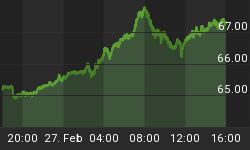This week, bond rating agencies Moody's and Standard & Poor's finally announced downgrades on billions of dollars of bonds backed by subprime mortgages. Though the cuts will certainly not reflect the full weakness of the bonds, and will not include nearly as many issues as they should, they nevertheless amount to the beginning of the end of the phony mortgage investment market and the unrealistically high home prices that it helped support.
In a sign of desperation, the U.S. has dispatched Housing and Urban Development Secretary Alphonso Jackson to Beijing to beg the Chinese to use some of their $1.3 trillion in foreign reserves to buy more U.S. mortgage backed securities. Talk about chutzpa! We bash them publicly, but behind the scenes we go hat in hand seeking their help. If the Chinese have any sense they will send the Secretary packing. After all, why should they use Chinese taxpayer money to bail out the U.S. housing market by purchasing securities that no American would touch with a ten-foot chopstick?
Is it just me, or haven't I seen this movie before? In the 1990's, the very Wall Street firms that created these securitized mortgage products were busy packaging worthless dot.com start-ups into multi-billion dollar IPOs. Back then the game involved in-house analysts slapping "strong buy" ratings on companies that the investment bankers themselves knew were worthless. This time around, the bankers persuaded ratings agencies such as Moody's and S&P to rubber stamp investment grade ratings on mortgage backed bonds that the bankers knew were extremely risky.
Unfortunately, investors have very short memories when it comes to these scams. They don't understand the profit motives that are behind Wall Street's cleverest strategies. Whether it's worthless companies or worthless bonds, Wall Street will sell anything if it can make a buck, no matter what it has to say or do to make the sale. The biggest problem for investors is that the riskier the investment, the more profit Wall Street makes selling it.
In its defense, S&P claims that their ratings were based on faulty data. This doesn't hold water because it would have been obvious to anyone with a drop of skepticism (and the agencies are supposed to have gallons) that the assumptions about mortgage performance were overly optimistic at best and completely unsound at worst. It is not by accident that "no documentation" loans have long been referred to by all levels of the mortgage industry as "liar's loans". Did the rating agencies possess some deep reservoir of faith in human financial honesty that everyone else lacked?
Also, to assume that these problems extend only to subprime debt is extremely naïve. Many prime adjustable rate mortgages will face similar problems as mortgage rates continue to reset higher. Despite their unblemished credit reports, many of the prime borrowers were "qualified" based solely on their abilities to afford the temporary teaser rates. No consideration at all was given to whether or not they could afford the higher rates to which those mortgages would ultimately reset. This also includes mortgages guaranteed by Fannie Mae and Freddie Mac!
The next group to face heavy scrutiny will likely be real estate appraisers. Similar to the way the ratings agencies "appraised" bonds with ratings that were far too high, real estate appraisers greased the skids of the mortgage industry by validating unrealistically high home prices. During the boom, most appraisers merely rubber stamped whatever price the parties had agreed to. However, the grim current news on home prices will force appraisers' hands. Rather than using comparable sales from a year or two ago, when everyone was buying and lending and no one was selling, appraisers will use more recent prices obtained though foreclosure auctions. Given the fact that such sales often occur for less then half of current "appraised values", new transactions will be impossible to finance at anywhere near current prices. Just imagine the economic fallout when that time bomb explodes.
However, the biggest downgrade yet to come could be for U.S. government debt. With the U.S. dollar breaking below long-term support, a significant near-term decline looks likely. Over the next few years a 50% markdown in the value of the dollar seems like a "best case" scenario. As this disaster unfolds, and U.S. interest rates soar as a result, S&P and Moody's may finally be forced to recognize the truth and lower their ratings on U.S. treasuries. If they are honest they will cut the rating all he way to junk!
More likely though, they will stick to their AAA rating until the bonds are practically worthless, either through legitimate default or hyperinflation, just as many dot.com analysts kept reiterating their strong buys practically to the point of de-listing. For those who do not want to go down with this ship, time is running out to get rid of your dollars. Got gold?
For a more in depth analysis of the tenuous position of the Americana economy and U.S. dollar denominated investments, read my new book "Crash Proof: How to Profit from the Coming Economic Collapse." Click here to order a copy today.
More importantly, don't wait for reality to set in. Protect your wealth and preserve your purchasing power before it's too late. Discover the best way to buy gold at www.goldyoucanfold.com, download my free research report on the powerful case for investing in foreign equities available at www.researchreportone.com, and subscribe to my free, on-line investment newsletter at http://www.europac.net/newsletter/newsletter.asp.















